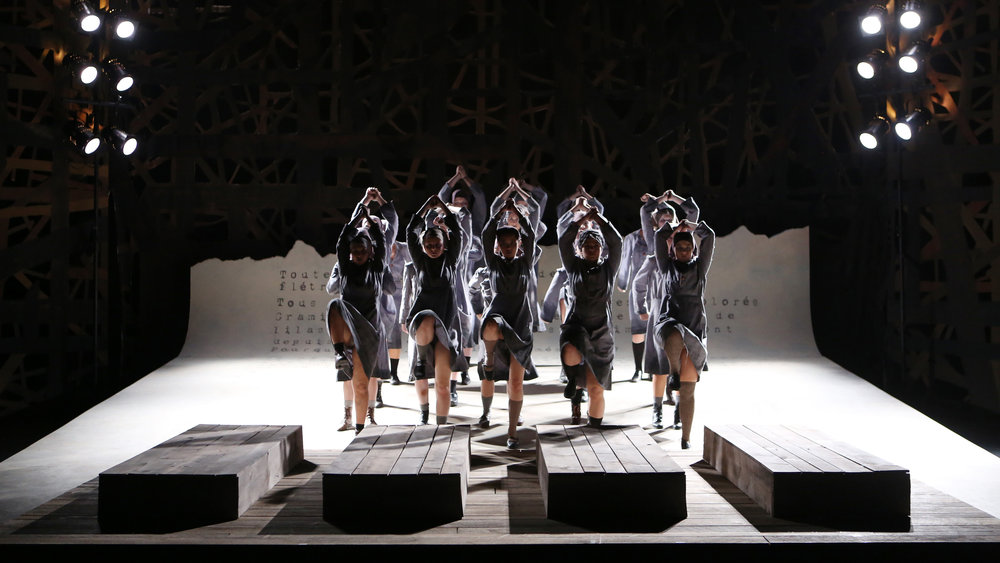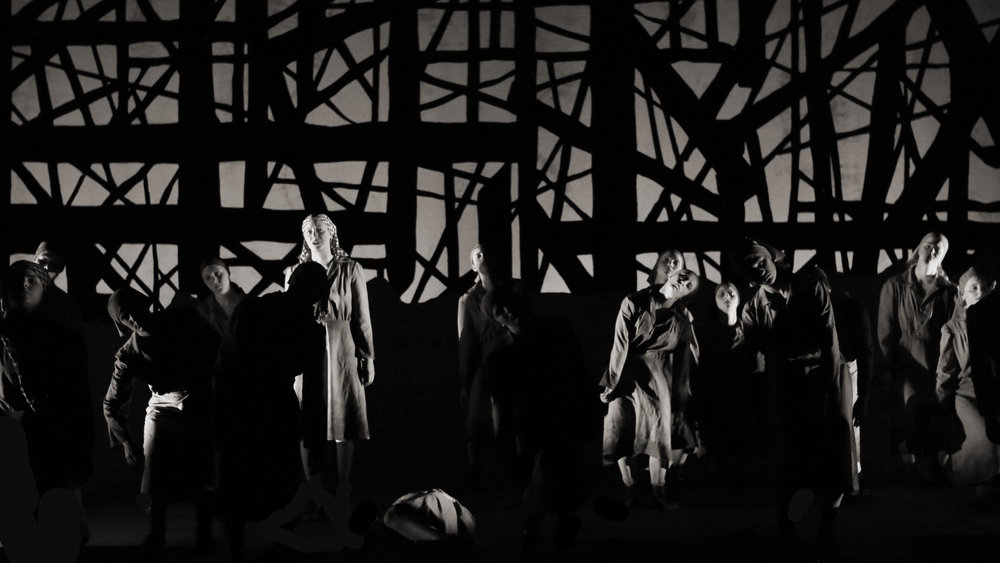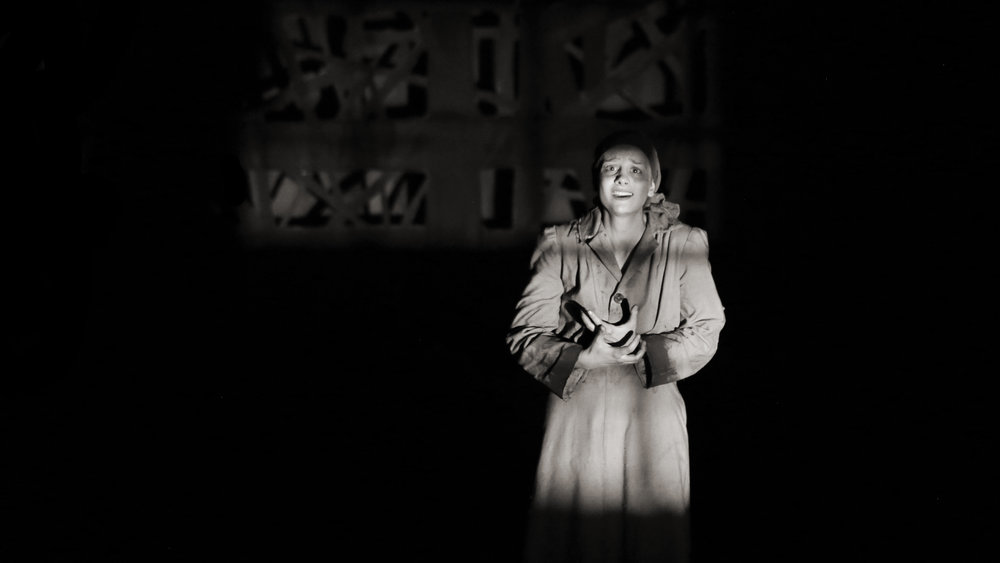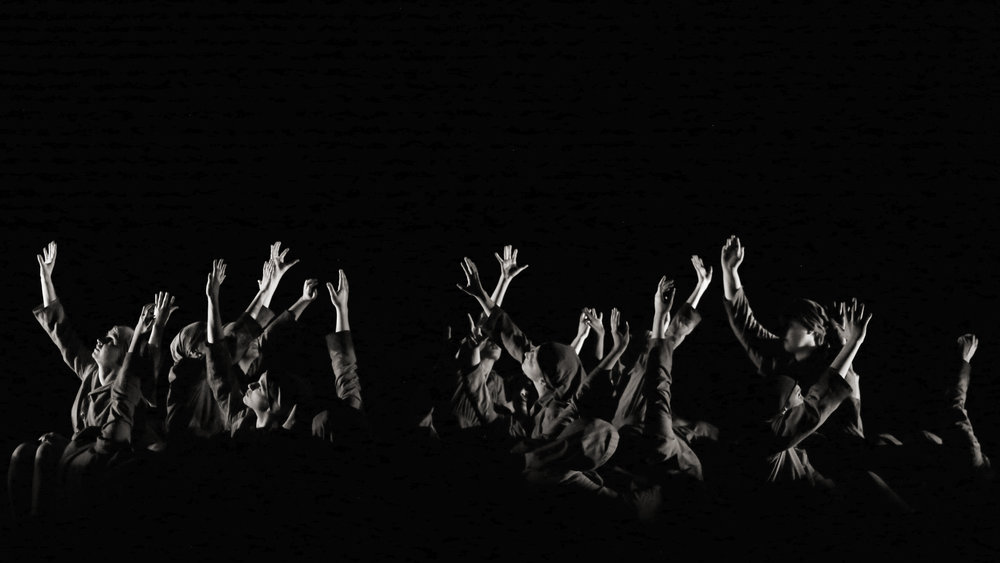
Photo: Sue Kessler
By Kellina Moore ’18
The JKB mainstage is set with a minimalist design: four large wooden boxes protrude from an otherwise empty stage. I think: “Caskets. Are those wooden caskets?” Upon further examination, I see words in French scrawled across the stone-looking floor and backdrop of the stage—an obituary? My friend, a French student, translates the first line: “The prisoners have been withering for a long time.”
Everyone walking into Who Will Cary the Word with me on opening night thinks they know what they are about to watch. They pull out tissues and brace themselves for heartbreak. The truth is, they are right about the heartbreak, but wrong about most everything else.
Who Will Carry the Word is a semi-autobiographical piece written by French resistance-fighter Charlotte Delbo. The play focuses on 23 French women living in the barracks of Auschwitz as political prisoners. Their goal is simple: they must keep one woman alive to tell their story to the world. During the long days, the women hold one another as they try not to collapse into the soft snow; at night, they pile on and around those four casket-like boxes—some shivering, some sleeping, some humming, and some, of course, dying. Each night, a couple of the women slip quietly offstage, and it is only after some time that I realize there are fewer of them. Before we know these women’s names, we know that they are dead.

Photo: Sue Kessler
In contrast to this horror is the undeniably beautiful style of Brooklyn-based theater artists and guest director Rebecca Marzalek-Kelly—most notably her blocking, which might more accurately be called choreography. The actors move like water; in a sea of grey dresses, they swell and shrink and envelop each other in waves of movement, collapsing and rising as one. Other times they move like firecrackers, limbs suddenly popping out in unnatural directions or shivering with an almost unwatchable violence. In one scene, the women crawl along the ground like desperate animals. In another, they audibly breathe together, their chests visibly moving up and down in time, solidifying their unity in life and in death. In another scene, I feel my heart lurch as they all reach their hands up into the dark above them. Whether they are reaching towards life or death, I am unsure.
It is no secret that the threat of death is a painful reality for these women. But as the play goes on, living becomes the true difficulty. “Everything has lost its shape, its depth, its sense, its color. All that is left is the amount of time we must suffer before dying,” says Françoise (Olivia Bagg ’19). The living is hard and the dying is harder, so they have no choice but to remain in painful liminality.
Still, each moment is a bit like a painting. The women, clad in uniform grey costumes designed by Leah Mirani ’18 and Julia Kelliher ’18, stare out at the audience like statues, or wrap themselves into one another to form a singular mass of human resilience. Each of the actors’ movements is deliberate, just as each of the women’s movements must be carefully chosen in order to survive.
The twisting, haunting choreography and powerful words of the actors are framed not only by Garret Wilson’s minimalist scenic design, but by Jared Klein’s similarly sparse lighting design. The actors are often lit from below, transforming them into living ghosts. Klein’s most beautiful moments occur when a beam of bright light emerges from the wings, beckoning a character offstage and into the cool embrace of death.

Sammy Bluth ’19 in Who Will Carry the Word. Photo: Sue Kessler
For the most part though, the words and movements of the women are allowed to speak for themselves. The only interruption is an occasional looming projection of Nazi soldiers, distorted like a mirage and accompanied by an ominous low baseline and a shocking lullaby, courtesy of sound designer Max Helburn ‘18. The juxtaposition of innocence and danger is present throughout—in one moment, Berthe (Laura McCullagh ’17) cradles her dying sister Dédée (Cara Geser ’20) as Gina (Madison Caan ’17) and Mounette (Sammy Bluth ’19) discuss pastries; in another, the women all lie stiff as boards as they sing a heartbreaking song, layering on more and more harmonies, turning the voice of the one into the voice of the many. There is the cold atmosphere of the camp, created by a minimalist set, sound, and costume design, but it is offset by the vibrant words of the women, by their ever-persistent hope.
As the play goes on and the women become fewer and fewer, the source of fear shifts again. No longer is the dominant fear that of living the day-to-day horrors, nor is it that of enduring a slow and painful death. No—as the weeks pass by, as Yvonne (Lindsay Nuckel ’17) says, in “all these minutes one by one, all these minutes one at a time,” the women’s greatest fear becomes what they will do if they return. They know they have a story to tell, but they have no idea how they will tell it, or if they are brave enough to tell it, or if anyone will even believe them when they do. But still they continue, until the very end.
Not only is Who Will Carry the Word a beautiful play, it is a play we need at this societal moment. It is a play about the strength of humanity; but in particular, it is a play about the bonds between women, which are too often overlooked as a source of courage and support. Despite all of its heartbreak, Who Will Carry the Word is a testament to motherhood and sisterhood and the unending life of hope.

Who Will Carry the Word. Photo: Sue Kessler
***
Kellina Moore ’18 is Assistant Editor of the Skidmore Theater Living Newsletter.
Production Photos
Reflections from the Cast + Crew
Olivia Bagg ‘19 (Françoise): I think one thing that was so special for me throughout this process was getting the chance to share and hear stories of women in our own lives. Every day, for the first couple weeks, we would all sit in a circle and whoever wanted to would share a story about a women in their life, showing that woman’s strength. It was so beautiful to learn about all the different ways one can show strength and learn about the stories that inspire my cast mates.
Erica Schnitzer ‘18 (Renée/Assistant Lighting Designer): From the perspective of someone who worked both as a performer and as a designer, this process was the most collaborative that I have ever experienced in a seminar production. Rebecca was very willing to support her team and trust that the right decisions would be made. She left a lot of room for creativity to be brought to the table both from on the stage and behind the scenes.
Leah Mirani ‘18 (Costume Designer): This was a fantastic group of people to work with, because we were all very focused on paying tribute to Delbo’s experience and message as much as possible, and as artistically as possible. I loved getting to look at the show from a historical and artistic perspective, with such a dedicated and involved team.
Production Credits
Written by: Charlotte Delbo (Translated by Cynthia Haft)
Director: Rebecca Marzalek-Kelly
Assistant Director: Shea Leavis ’17
Stage Manager: Omi Furst ’18
Scenic Designer: Garret Wilson
Lighting Designer: Jared Klein
Sound Designer: Max Helburn ’18
Costume Designers: Julia Kelliher ’18 and Leah Mirani ’18
Hair + Makeup Designer: Laura McCullagh ’17
Cast: Olivia Bagg ’19 (Françoise), Sammy Bluth ’19 (Mounette), Madison Caan ’17 (Gina), Mira Chen ’19 (Marie), Kallan Dana ’19 (Claire), Kristen Danyluk ’17 (Laure), Alexandra Dennis ’18 (Hélène’s Mother), Lulu Fairclough-Stewart ’19 (Agnés ), Cara Geser ’20 (Dédée), Julia Guy ’19 (Monique), Karen Hafter ’19 (Hortense), Rowen Halpin ’19 (Sylvie), Grace Keir ’20 (Lina), Serena Lehman ’19 (Madeline), Zoe Lesser ’19 (Elisabeth), Laura McCullagh ’17 (Berthe), Molly McGourty ’20 (Small Peasant Girl), Lindsay Nuckel ’17 (Yvonne), Rose O’Gara ’20 (Hélène), Miranda Park ’17 (Réine), Erica Schnitzer ’18 (Renée), Allyson Schult ’17 (Régine), Amina Theis ’17 (Denise)
Crew: James Varkala (Assistant Technical Director), Anna Gerber ’17 (Assistant Stage Manager), Romi Moors ’18 (Assistant Stage Manager), Allyson Schult ’17 (Dramaturg), Amanda Corey ’17 (Assistant Costume Designer), Erica Schnitzer ’18 (Assistant Lighting Designer), Catherine Heller ’17 (Assistant Scenic Designer), Sarah Markley ’19 (Charge Scenic Artist), Chloe Brush ’18 (Master Electrician), Colin Johnston ’19 (Sound Operator)















